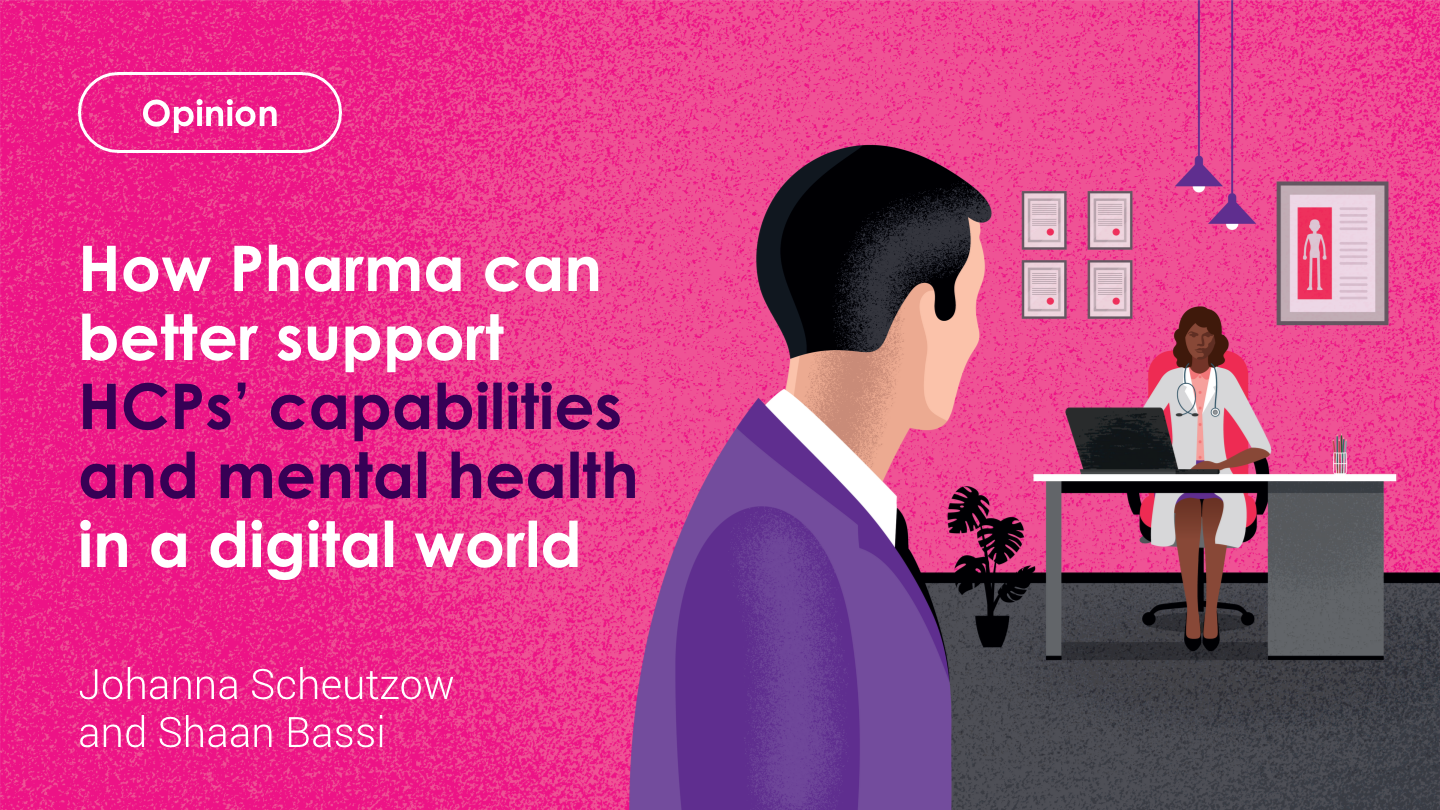
How pharma can better support HCP mental health in a digital world
The ‘people at the heart of care’ are not just patients
By Johanna Scheutzow, Capability Writer and Shaan Bassi, Insights Director
Wellbeing in healthcare and patient-centricity are increasingly in focus as the UK government launches a new reform of adult social care (2022), including a 10-year vision for transforming support and care, putting people at the heart of care.
Patient involvement in their healthcare has evolved, particularly during the COVID-19 pandemic, and access to HCPs continues to be limited. The biggest changes involve the use of digital platforms, which helped to remove some of the long-standing barriers to patient engagement, such as geography, inaccessible environments and cost. Virtual working and digital connection have powerfully enhanced patient engagement and are here to stay, beyond the constraints of COVID-19.
The Creative Engagement Group set out to explore this evolving landscape from a HCP’s perspective, to understand the experiences and challenges of HCPs and the opportunities for industry.
Patients are at the forefront of wellbeing, how about our HCPs?
Supporting patient outcomes remains the primary goal of HCPs and the pharmaceutical industry. As an example, we’ve seen the wide implementation of patient support programmes (PSPs) that offer guidance from pharma specialists to patients, who are often required to make high-stakes decisions beyond their reasonable expertise.
So, we know patient wellbeing is at the heart of engagement for HCPs; however, our data shows that HCPs would also value support. Their time and resource has been stretched to extreme levels over the past two years and in addition to this, new working practices are being implemented at an alarming rate, impacting patient care.
Our data shows that
40% of HCPs would like support and recognition for the additional stress and emotional burden they have experienced during the pandemic
Healthcare workers remain highly likely to experience poor wellbeing due to challenging, or even traumatic, situations with patients, work schedules and long hours. These factors put them at risk of stress, burnout, moral injury, depression, anxiety, trauma and other mental health issues (Søvold, et al. Front Public Health 2021;9:679397).
The role of pharma
Pharmaceutical companies have historically been good at offering HCPs non-clinical development support and educational resources, such as access to training and support with presentation skills. However, there is an opportunity to offer broader support. Specifically, HCPs have indicated that they need support in virtual consultations and engaging with patients, helping them to deliver better patient care and outcomes. We found that:
50% of HCPs would like help with innovative solutions for patient remote monitoring
Remotely assisting patients proved to be a consistent issue, as:
31% of HCPs wanted advice / training on how to conduct virtual consultations
A further 35% were in favour of hotline / telemedicine support
HCPs are also looking to pharma to uncover and tackle patient concerns and habits.
48% wanted disease-specific campaigns, encouraging patients not to delay seeing their doctor
Overall, physical and mental wellbeing of health and care staff must be of equal priority to that of patients. Pharma could hold the key to solving these issues while building stronger partnerships with HCPs.
What can be improved?
Promoting the wellbeing of HCPs could be essential to building meaningful relationships and successful partnerships that lead to better patient outcomes.
There are some simple, yet effective ways to implement these changes.
Encourage open conversations to build resilience
Pharma companies need to empower their field teams with competencies to have compassionate and open conversations that enable them to recognise, acknowledge and validate the feelings, challenges and needs of HCPs. Being able to really listen, to adjust their communication style at the right moment, to recognise and respond appropriately when someone presents signs of stress and to be able to refer them to support and resources such as engagement tools, PSPs, etc., promotes trust and strengthens relationships. Trust and openness may not only be fostered by field teams who feel confident to acknowledge and validate emotions in conversations between themselves and HCPs, but also between HCPs and their patients. Empowering HCPs to navigate emotionally challenging conversations, such as empathetically informing a patient of a life-changing diagnosis, will enable HCPs to feel supported and enhance the patient's experience.
This can bring back the emotional element that is particularly challenging in virtual encounters. Connecting with others and sharing one's feelings strengthens people's resilience (NHS: 5 steps to mental wellbeing, November 2019). It creates a sense of belonging and self-worth, provides emotional support and the opportunity to support others and also share positive experiences.
Instil a culture of compassion from leadership
It also means that pharmaceutical companies need to empower healthcare professionals with new capabilities as leaders. Healthcare leaders carry the responsibility to normalise the conversation within their team to reduce stigma associated with poor mental health among healthcare staff and lead a culture of transparency, trust, respect, openness, equality and For example, pharmaceutical companies could become the partners that empower HCPs with these skills by sharing best practices, promoting social learning and providing learning and development opportunities.
Equip people to manage mental health in a practical way
Training programmes should focus on healthy coping strategies and self-care plans. These increase people’s ability to embrace change and provide tools to enhance conversation skills, self-awareness, self-compassion and stress management. They also provide techniques to combat compassion fatigue in health professionals and mental health issues, as well as create team resilience. Peer support and psychological safety at work will nurture resilient teams and empower them to face the challenges of today, and the future.
Invest in people development to match the pace of evolving practice
Finally, there is a need for new capabilities tailored to support the current telemedicine environment, platforms and solutions. Field teams and HCPs share a common goal of creating impactful engagements in virtual environments with their clients to truly identify their concerns, habits and needs to improve patient outcomes. This means that pharmaceutical companies have great potential to improve PSPs, increase patient and HCP wellbeing and trust, and improve the therapeutic pathway to improve patient outcomes. Therefore, being the partner that nurtures competencies to deal with current needs and challenges and empowers HCPs to embrace new ways of providing compassionate patient care, is the key to putting people at the heart of care.





